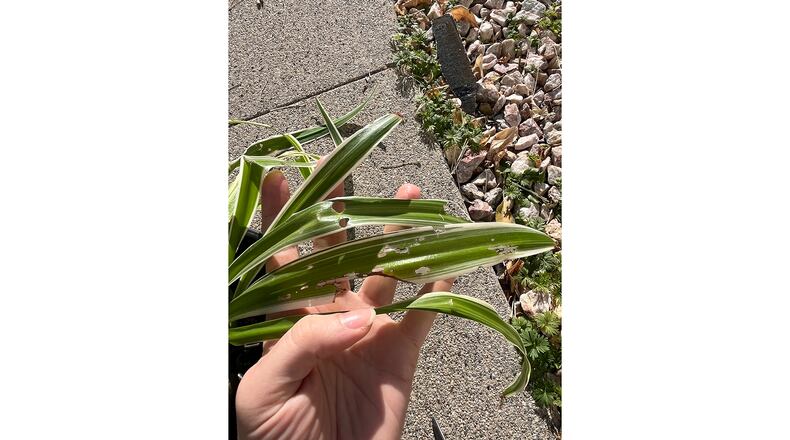Q: I went out of town and left my spider plant hanging in a friend’s enclosed workroom. When I got back two weeks later, the leaves had big holes and the tabletop underneath was covered with tiny black specks. How do I get rid of these eggs and the creature that ate my plant organically? Shawn McDonald, Covington
A: The good news is that the black specks probably aren’t eggs. Instead, I’ll bet they are the gastric leavings dropped by whatever creature enjoyed your plant. It could be either a caterpillar or a snail. If it was a caterpillar, you would have seen it before you left. It’s not likely that there was enough time for a caterpillar to grow big enough to make large holes.
That leaves snails as the culprit. They are mobile enough to crawl from a couple of feet away to the pot and have a munch for lunch before departing. I see several places on the leaves where a snail could linger and rasp just the top layer of cells, leaving a windowpane effect. Chew a bit deeper and a hole in the leaf is formed. So you (or your friend) have snails that chew on plants. What can you do about it?
The most effective control is totally organic: diatomaceous earth. This material is mined in California, where once shallow seas contained tiny diatoms, which, when they died, left skeletons with extremely sharp microscopic edges. Get some diatomaceous earth from a garden center and sprinkle it on the surface of your pot’s soil. Any snails that crawl over it will have their undersides sliced to ribbons by the diatomaceous earth.
Q: I have a huge live oak tree which once had healthy St. Augustine grass beneath, but now it has mostly gone away. The yard man mulched dead leaves onto the grass without raking them up in the spring for the last few years. Would leaving the mulched leaves adversely affect the grass? John Woodward, Dougherty County
A: There is a pitched battle for survival going on beneath your oak. The St. Augustine is desperate for light. To weaken the tree, it grabs every morsel of nutrition and every drop of moisture possible with its shallow root system. On the other hand, your tree is attempting murder by starving light from the grass. As you report, the tree is slowly winning. The mulched leaves did not affect the outcome. They didn’t acidify the soil. You now have to make a decision about how far out the tree can spread.
Email Walter at georgiagardener@yahoo.com. Listen to his occasional garden comments on “Green and Growing with Ashley Frasca” Saturday mornings on 95.5 WSB. Visit his website, walterreeves.com, or join his Facebook page at bit.ly/georgiagardener for his latest tips.
About the Author
The Latest
Featured

